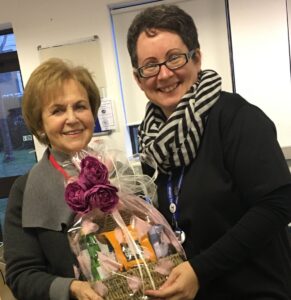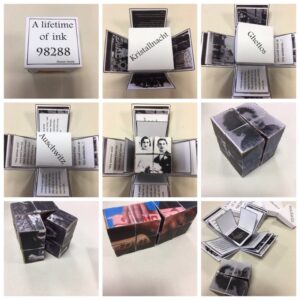
Our lives are filled with turning points, moments that changed things for the better or indeed the worst, events or experiences that change the way we think, feel, and act – and this year’s Holocaust Memorial Day theme ‘One Day’ resonates on that level, as it marks ‘one Day’, 27 January when the Auschwitz-Birkenau complex was liberated. Yet the theme also offers other lens, a specific date like 20 January 1942 and the Wannsee Conference that might be considered a turning point or significant moment in the terrible history of the Holocaust, or perhaps ‘one day’ on 8 October 1942 when for Leon Greenman and his family ‘everything changed’, or could be the hope that Holocaust survivors clung to that ‘one day’ the war would end, they might return home and perhaps be reunited with loved ones.
As a teacher, this Holocaust Memorial Day and its theme ‘one day’ speaks to our sense of vocation, our educational vision and, as Holocaust educators a sense that talking and teaching about the Holocaust should enable young people to learn and remember the past, to make sense of their present and equip them to participate in the work needed to fulfil the demand for ‘Never again’, to aspire to making ‘genocide history’.
So, what as a teacher, in a UCL Quality Mark Beacon School, were my turning points, moments, events or ‘One Day’ experiences that I reflect on this Holocaust Memorial Day?
Well, ‘one day’, about 8 years ago, I first encountered the Holocaust in schools when I took on the responsibility of teaching History. As a child and young adult I had heard fragments of conversations between my German-born great aunt and my family about her swift departure from Wuppertal, Germany to England as a teenager and later on pieced together, studying Contemporary European composers of the 20th century as a Music degree student, a deeper understanding of life in Germany in the 1930’s. Visits to Germany to meet family as a young adult always left me wanting to know more and asking the question, ‘what would ‘one day’ have been like here for Tante Doris?

‘One Day’ much later, as an adult and a teacher of History, I was given the privilege of applying for the Beacon School programme. UCL training started in earnest and in ‘one day’, I had found the validation and inspiration that I had searched for. Sitting in the IWM London, surrounded by the Centre team and among esteemed colleagues from across the country, I experienced a real turning point. The enduring visual memory of each and every person in that one room, in that one moment, looking at one shoe, on that ‘one day’, shaped the days and years to come.
A turning point in learning often comes when our understanding is challenged, our thinking changed-and ‘One day’ on the residential when UCL Centre research revealed the extent to which students experienced an ‘Auschwitz-centric’ understanding of the Holocaust, it highlighted to me the importance of shifting to a much wider focus. It turned our student experiences from one camp, one lasting visual memory, in to a multi-faceted, richer experience for our students. As a result, returning to the classroom, we fully embrace students as researchers and facilitate research into the camp system, encouraging and celebrating a wide range of student findings. The difference in that one activity was palpable. Our classrooms transformed into a hub of investigation, curiosity and higher-level thinking. That one task started to show us what could be achieved. Our students proudly presented their findings about many different camps, widening and strengthening their geographical and chronological understanding. The real power behind one moment when students were presenting their work to the rest of the class, was one question I asked myself… ‘Should we assess student understanding in only one way?’
‘One Day’ during the UCL Beacon School study visit to Poland we were taken to Treblinka, site of the former Nazi extermination camp. On a personal level, I found (and still find) it impossible to describe the experience using words. Standing among the trees, I had chosen to spend a moment alone with my own thoughts. I could only think of one way to respond to this moment – that was to draw. I felt a need to capture this one moment that transformed how we think about assessment when teaching students about the Holocaust.

After my return from Poland I began to develop and refine our thinking about Holocaust teaching and learning in school. We had almost reached the end of our scheme and ‘one day’ I was collecting in student homework. One student had created the most awe-inspiring entry. Instead of writing about what she had learned, she had made a set of nestling boxes. When I asked her about her inspiration for this homework, she said ‘I couldn’t just write about the Holocaust as ‘one thing’. I couldn’t even describe it in words, so I made it’. This one tiny set of boxes from one student, based on the narrative of the Greenman family, profoundly impacted us as a department and we keenly set about supporting and facilitating students to express their knowledge and understanding in any way they felt appropriate to them.
‘One Day’ in 2018, we had the honour of welcoming survivor Mala Tribich to school to present to our staff. Mala’s powerful testimony and request to us as a staff to ‘Tell the stories of those that can not’, offered us further inspiration to extend learning about the Holocaust beyond the doors of the History classroom and into the wider college community. Our art exhibition of pieces of every students work across KS3 and project by our art teacher, Mrs. Jones, showed the power of one survivors testimony and the impact of one days visit, offering us a real enduring memory and scope for further development as a community and as a Quality Mark Beacon School.
‘One Day’ during the lockdown a box was delivered to school – the recently published UCL Understanding the Holocaust and how did it happen? textbook – it was a turning point, not just for us as a College, but also as a UCL Beacon School, now part of a worldwide community, committed to providing teachers and students with a ground-breaking resource, firmly based in evidence and research. When I look through this textbook, I am taken back to that ‘one day’ in London in 2016 and reflect on how far we have come since that one moment, that one shoe.
All these moments, turning points, opportunities, challenges and experiences means for me and Torpoint Community College, Holocaust Memorial Day is not just ‘one day’ a year, but an ongoing, daily commitment that resonates across the whole curriculum, is in line with our values and ethos – ‘inspiring optimistic learners’. We are a Beacon School and thus it is a whole school commitment, part of our DNA ‘everyday’.
I am just one teacher, passionate about Holocaust teaching and learning, but I feel sure this Holocaust Memorial Day many colleagues across the country will be reflecting similarly on the moments that have shaped their work; the support or CPD received from UCL, an encounter with a survivor, a site-visit abroad, or an enduring personal childhood memory. Whilst looking back is a necessary part of remembrance and reflection, it also urges you to face forward and consider new opportunities, embrace new challenges, so my hope is that one day colleagues in schools across the country experience something of what I did, and apply to become a Beacon School, or that they are inspired to be courageous about the potential of taking ‘one moment’ and shaping a future, so that ‘one day’, we will live a world free of hate, antisemitism, human rights abuse and genocide.
By Charlotte Lane – Torpoint Community College

